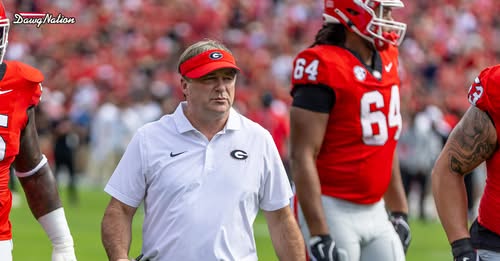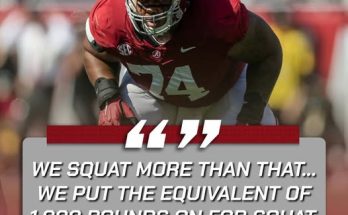The Georgia Bulldogs added another blue-chip talent to their quarterback room on Monday, landing a commitment from 5-star phenom Jared Curtis. The announcement sent waves through the college football world, as the Nashville native picked the Bulldogs over a host of national powerhouses including Alabama, Tennessee, Ohio State, and LSU. For Kirby Smart and his staff, this is a huge win on the recruiting trail. But with the way college football is trending, landing a 5-star quarterback is only half the battle — developing, keeping, and maximizing them is the hard part.
Curtis, a 6-foot-3, 215-pound quarterback with a cannon arm and surprising mobility, has been on the radar since his freshman year of high school. He’s dominated elite 7-on-7 circuits, shredded high-level competition in Tennessee, and developed into one of the most polished quarterback prospects in the country. He brings a rare blend of physical tools and poise that has scouts comparing him to recent first-round NFL Draft picks. But for all the hype and excitement surrounding his pledge to the Bulldogs, one truth remains clear: Georgia’s future at the quarterback position will depend less on recruiting rankings and more on navigating the chaos of the modern college football landscape.
Curtis is the latest elite quarterback to commit to Georgia, a program that’s had no shortage of talent in that room over the past decade. From Jake Fromm to Justin Fields, JT Daniels to Carson Beck, the Bulldogs have consistently signed top-tier passers. But what they’ve struggled with at times — and what the rest of the country is dealing with too — is retention and development. Fields famously transferred to Ohio State and became a Heisman finalist. Daniels bounced to West Virginia. Even Beck, who eventually became the guy, had to wait longer than most blue-chippers are willing to sit these days.
That’s the challenge Georgia now faces with Curtis. Getting him was the easy part. Convincing him to stay and reach his ceiling in Athens? That’s where the real work begins.
In today’s era of NIL and the transfer portal, elite quarterbacks don’t wait their turn. They don’t stick around in systems that don’t showcase their talents. They move on quickly if the depth chart doesn’t break their way. Programs like Alabama, Texas, USC, and Oregon have all felt this volatility. Five-star arms committing one year, transferring the next. It’s a carousel that keeps spinning — and it forces coaching staffs to walk a tightrope between winning now and planning for the future.
For Georgia, the long-term play with Curtis will require transparency, creativity, and buy-in. Kirby Smart and offensive coordinator Mike Bobo must not only sell a vision — they have to deliver on it. Curtis will need to see a clear developmental path. He’ll need opportunities to shine, even early in his career, whether that’s in mop-up duty, packages, or live-game situations. Because if he doesn’t feel like the program is fully invested in him, he’ll have 50 other options waiting.
This is also where the staff’s recent success can work both for and against them. Carson Beck’s return for another season in 2025 means Georgia will be competing for a national title with a veteran leader under center. That’s a great thing — but it also likely means Curtis won’t sniff the field in his first season. And with talented backups like Gunner Stockton and Ryan Puglisi already jockeying for position, there’s no guarantee Curtis walks in as the clear-cut heir. It’s a crowded room, and elite quarterbacks don’t like to feel like one of many.
However, Georgia’s recent track record should give Curtis reason for optimism. Beck’s emergence as a first-round prospect is a testament to the staff’s ability to mold talent. The Bulldogs have become a legitimate pipeline to the NFL across multiple positions, and quarterback is trending in that direction too. The infrastructure is there — elite offensive line play, explosive weapons, a dominant defense to support the offense, and a national spotlight every week. For a player like Curtis, it’s the ideal stage. But it has to come with trust, reps, and a real plan.
What also can’t be overlooked is Curtis’s competitive makeup. Those around him describe him as laser-focused, mature beyond his years, and hungry for greatness. He’s not just chasing NIL money or viral clips — he wants to win, and win big. That makes him an ideal fit in Smart’s program, which has built its identity on toughness, discipline, and accountability. But even the most driven competitors are susceptible to the pressures and temptations of modern college football. Curtis will undoubtedly be courted by other programs, both subtly and overtly, if he ever expresses dissatisfaction or falls behind the depth chart.
That’s why building a relationship with him that goes deeper than football will be crucial. The most successful programs in the country are doing just that — forging family-like connections, investing in players beyond the playbook, and surrounding them with a culture they don’t want to leave. Georgia has built that kind of culture under Smart. Now, they’ll need to double down on it with Curtis.
There’s also the matter of evolution. The quarterback position itself is changing. The best college programs are not just developing traditional pocket passers — they’re unleashing dynamic playmakers who can extend plays, run read-options, and throw with precision from multiple platforms. Curtis has the arm talent, but he’ll need to refine the rest of his game to reach that elite tier. Georgia’s offensive scheme, once considered too conservative by some, has evolved under Bobo and could take another leap with a talent like Curtis. Designing an offense that empowers him rather than restricts him will be key.
And then there’s the timing. Curtis is still in high school. A lot can happen between now and when he actually signs. Recruits flip all the time. Coaching staffs change. Life changes. Georgia’s job isn’t done just because he made a verbal commitment. They’ll need to keep recruiting him every day, building that trust, and ensuring that no other program can sneak in and sway him. In this climate, no commitment is ever truly final until the pen hits paper — and sometimes, not even then.
But for now, this is a win worth celebrating. Curtis is as talented a quarterback as Georgia has ever landed, and his presence sends a message to the rest of the sport: the Bulldogs aren’t just a defensive powerhouse anymore. They’re serious about building elite quarterback play, and they’re stacking talent at every position. If they can get the most out of Curtis — keep him, develop him, and eventually unleash him — the payoff could be another national championship and a first-round NFL pick.
Still, that’s a lot of “ifs” in a sport increasingly defined by variables and volatility. Quarterbacks are no longer guaranteed to stay, and blue-chip recruits are no longer guaranteed to pan out. That’s the reality of 2025 college football. And it’s the reality Georgia must navigate with their latest prize.
Getting Jared Curtis was the easy part. Now comes the hard part.



